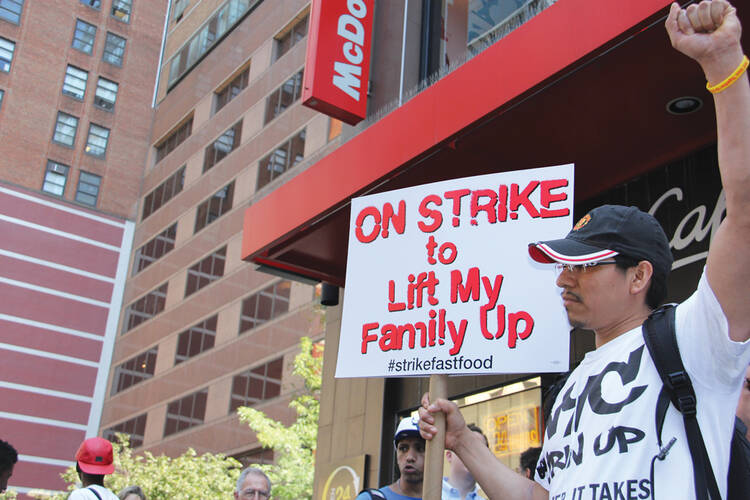‘I’m doing this for my future, for my sons to have a union,” Jamne Izquierdo said, holding up a sign demanding a better wage outside a McDonald’s restaurant on 8th Avenue and 56th Street in New York on Sept. 4. Izquierdo has worked at a different Manhattan McDonald’s fast food restaurant for eight years, and earns just $8.20 an hour, a wage that leaves behind each month “a lot of bills, a lot of problems,” she said, shaking her head.
The New York protests were a small part of the nationwide fast-food workers strike, an effort coordinated with nonunion fast food workers, civil society groups like “Fast Food Forward” and “Fight for $15” and national unions. Like thousands of workers across the United States who picketed fast food restaurants in more than 100 cities in a growing national effort to highlight the predicament of the nation’s low wage workers, Izquierdo complains that there is no way for her to get by and care for her two boys on a minimum wage, currently $7.25, or near minimum wage salary. Worse, she said, like most of the other employees at her franchise, she has been unable to get the full-time hours she has requested. The owner of her franchise puts her on the work schedule just four days a week.
Many who argue that setting wages is best left up to the market may want to keep in mind what Izquierdo said next. Asked how she can possibly get by in New York on the $180 a week she earns at McDonald’s, Izquierdo explained that the government has stepped in where her weekly wage fails her. Izquierdo and her two boys live in a Section 8 apartment and qualify for federal nutrition support programs and Medicaid. In other words, taxpayers are keeping her and her small family above water—barely—while she goes to work each week for one of the most profitable fast-food corporations in the world.
The Rev. Clete Kiley, a priest of the Archdiocese of Chicago who currently works as director of immigration policy for Unite Here, the hotel, restaurant and textile workers’ union, in Washington, D.C., points out that the movement has the potential to affect far more people than the workers at fast food restaurants. “Clearly they’re laying out an issue that is bigger than McDonald’s and other [fast food] places,” Father Kiley says.
“Folks are working harder and they are falling farther behind; they are working multiple jobs and cannot even work full-time. Our tradition talks about a living [just] wage; we don’t even talk about a minimum wage.
“We are nowhere near a living wage and that is [a concern] that we as a church bring to the table constantly.” Catholic social teaching talks about a just wage, and he said,“by that we mean a wage that allows workers to support a family, that allows them to put something aside for their future and have adequate health care.”
Father Kiley adds, “Pope Francis has used this phrase a number of times; he’s talked about ‘an economy that kills.’” The pope is not necessarily speaking metaphorically, Father Kiley argues, citing the case of Maria Fernandes, a 32-year-old Newark woman found dead after she napped in her car while waiting for a shift to begin at one of the four part-time jobs she held down. Police report she succumbed to a deadly mixture of carbon monoxide and fumes from an overturned gasoline container.
“Pope Francis is also speaking globally,” Father Kiley says. “People are dying crossing oceans to find work, and people at our own borders are dying in the desert because of the way the economic structure is set up. They have to find a way to make a living and they are dying in the process.”








